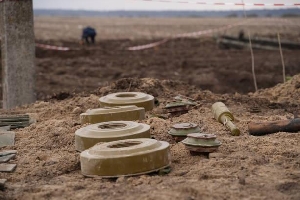Ghana, through the National Commission on Small Arms and Light Weapons (NACSA), is set to host a 3-day regional conference on the need to address the humanitarian impact of improvised anti-personnel mines in West Africa and the Sahel Region within the framework of the Convention.
This event will be help in partnership with the Implementation Support Unit (ISU) of the Convention on the Prohibition of the Use, Stockpiling, Production, and Transfer of Anti-Personnel Mines and on Their Destruction.
The Convention is the international community’s comprehensive response to the humanitarian impact caused by anti-personnel mines which are indiscriminate weapons that remain dangerous for decades after conflicts have ended.
In 2019, the Convention took a significant step by adopting the Oslo Declaration on a Mine-Free World.
While recognizing achievements, the Declaration emphasised persistent challenges, particularly the increasing threat posed by anti-personnel mines, including the use of improvised ones by armed non-state actors, and their impact on human life and sustainable development.
Given the alarming humanitarian effects of improvised anti-personnel mines in West Africa and the Sahel Region, there is a renewed interest in addressing this critical issue within the framework of the Convention.
The regional conference will therefore have as its overarching focus the need to address the devastating humanitarian impact of improvised anti-personnel mines, in West Africa and the Sahel Region.
Scheduled to take place from February 13-15, 2024 in Accra, the upcoming conference offers a platform for a technical discussion on best practices and lessons learned within the framework of the Convention.
The conference will be attended by representatives from States Parties to the Convention in West Africa and the Sahel Region, as well as leading UN agencies, the International Committee of the Red Cross and experts working in mine action.
It also provides a unique opportunity to assess progress and contribute to the development of a new action plan for the period 2025-2029.
The event is made possible through a global project sponsored by the Council of the European Union (EU) to support the implementation of the Convention.
This effort is underpinned by the European Union Council's Decision (2021/257), which, among other objectives, supports "dialogue and actions that can contribute to establishing sustainable national capacities to address previously unknown mined areas; increase regular dialogue with stakeholders; and explore opportunities for cooperation (international, regional, triangular, and south-south) to address remaining challenges.”
Ghana stands poised to host this important event, dedicated to addressing the critical humanitarian issue of improvised anti-personnel mines in West Africa and the Sahel Region. This conference reflects Ghana’s commitment to fostering diplomacy, cooperation and decisive action to mitigate the impact of these mines.
Regional News of Friday, 9 February 2024
Source: National Commission on Small Arms and Light Weapons

















